
Before we even get into this selection of songs — the conclusion of Disc Two, for those of you playing along at home — this exchange…
Dw. Dunphy — Two “legit” songs, a TV show theme and two songs I consider novelties. I miss the ’80s.
Jon Cummings — Which two are “legit”? The one that talks about a woman who’ll “chew you up,” and includes the line “The woman is wild, woo-oo-oo-ooo-oo”? Or the one that includes videogame bomb sounds? That’s the great thing about the ’80s — even the “legit” songs sounded like novelties.
#16 Hall & Oates, ”Maneater” (1982)
Topped the Hot 100 for four weeks.
[youtube id=”yRYFKcMa_Ek” width=”600″ height=”350″]
Cummings — I’ve never been fully on board with Hall & Oates’ biggest hit, despite the fact that they were my favorite (current) group when I was in high school. “Maneater” fits squarely into my “Daryl Hall overreach” box, what with its panoply of vocal tics, dodgy lyrics and general misogyny. But then, the track is pretty much all about that bassline and sax solo, so how much do those vocal/lyrical issues really matter?
Feerick — At the top of this series, I mentioned that the recurring subtext of 80s music, it seemed to me, is negotiating pop’s complicatde relationship with its own past — of reconciling the best of old and new to create something that will be timeless. ”Maneater” is a case in point.
When we talked about H&O back in the AM Gold days, I wasn’t entirely sold. I dug the soul influences on their 70s hits like ”Sara Smile,” but there just wasn’t enough muscle to keep me interested. This, for me, is where the band finally starts to gel.
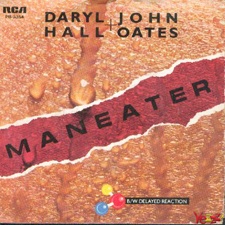 And they do it by adding New Wave atmospheres to an R&B framework. The snare beat and the snap of the rhythm guitar are straight off a Supremes record; but when it’s locked in with those icy synths and the huge echo on the vocals (and especially on the sax, such that it duets with itself), it becomes incredibly propulsive.
And they do it by adding New Wave atmospheres to an R&B framework. The snare beat and the snap of the rhythm guitar are straight off a Supremes record; but when it’s locked in with those icy synths and the huge echo on the vocals (and especially on the sax, such that it duets with itself), it becomes incredibly propulsive.
Java Joel Murphy — Hall and Oates were THE greatest pop singles artist of the early 1980s. Sorry, MJ. Sorry, Prince (you were the greatest pop albums artist of the 80s). Bruce? Not even close.
Here’s the deal. If Hall and Oates had been born with pigmentation in their skin, they’d be deemed musical geniuses by the rock press. But since they were honkeys that dabbled in “black” music (that’s what they called it in the early 80s), they were labeled cornballs. Ironically, the R&B audience gave ’em more respect than the pop/rock crowd. Enough with the mustache & mullet jokes. They were brilliant.
Feerick — H & O as reverse Elvises? Multiplatinum-selling artists as victims of reverse-racism?
That’s, uh… that’s a bold statement, Joel, and I think I’ll leave it at that.
Dave Lifton — Never one of my favorites of theirs. It’s a solid performance from everybody involved and as polished a record as you’re ever going to hear, but that bassline was too nagging and the lyric was too silly. ‘You Can’t Hurry Love” has a much better chord progression for that same bass part.
Dan Wiencek — Most of H&O’s ’80s ouevre struck me as almost painfully catchy, so upbeat and peppy (regardless of the actual subject matter) that I found it grating. Not this one though. This is the real thing: soulful and executed with considerable restraint as well as finesse. I like that the sax does what a sax should, lending color throughout the arrangement rather than being dumped on top for atmosphere. (You guys are sure “Careless Whisper” isn’t on this set, right?)
Dunphy — Hardly my favorite Hall and Oates song, and considering that just a brief ten years ago I’d have disavowed ANY song being my favorite Hall and Oates song, there is still something irresistible about “Maneater” — I think it is because, for a pop confection, it has plenty of atmosphere and mood. It didn’t have to. It’s about a woman who really, really, really likes sex. That has never suffered poorly on pop charts before.
And to answer your next question; “Some Things Are Better Left Unsaid.”
Feerick — Hell, yes. The guitar rave-up at the end of that one? Fried gold.
#17 Mike Post with Larry Carlton, ”The Theme from Hill Street Blues“ (1982)
Reached #10 on the Hot 100.
[youtube id=”Je2fGzKiqRM” width=”600″ height=”350″]
Cummings — I don’t think this works outside its 30-seconds-of-credits context nearly as well as Post’s Rockford Files theme did. It’s evocative enough, I suppose, but the three minutes of noodling don’t really add to the experience.
Wiencek — I found this kind of a melancholy number as a kid, and it was a fitting choice for a more introspective cop show than TV had really seen to that point. (At this age, I was a Knight Rider and A-Team guy, and all I really knew about Hill Street Blues was that my dad watched and so it looked kind of boring.) Still, three minutes is kind of pushing it, no?
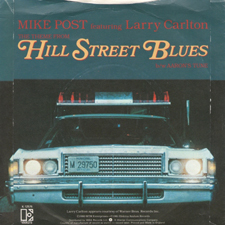 Feerick — ”Melancholy” is part of the charm, I think. Between this and Taxi, my brain has been forever trained to associate images of New York City with vaguely bummed-out piano jazz. Overcast pre-dawn skies, grimy buildings, wet asphalt, steam vents. A New York City where the sun never shines.
Feerick — ”Melancholy” is part of the charm, I think. Between this and Taxi, my brain has been forever trained to associate images of New York City with vaguely bummed-out piano jazz. Overcast pre-dawn skies, grimy buildings, wet asphalt, steam vents. A New York City where the sun never shines.
And ”boring” was part of the allure, too. Hill Street Blues was the first ”grown-up” show I ever watched regularly, sitting up late, just me and my Dad. And I understood that adult entertainment was not about explosions and catchphrases and white-knuckle thrill rides — that it was quiet and interior and character-based. If I could watch and enjoy Hill Street Blues, I thought, this was some kind of rite of passage.
And I did. HSB taught me a lot about narrative art — maybe more than it meant to; about managing an ensemble cast, about the power of subverting expectations, and about the letdown of artistic compromise. At the end of the pilot episode, officers Hill and Renko — who had been set up as the main audience-identification characters — end up in the wrong place at the wrong time and are gunned down like dogs in a robbery gone bad. It was random, it was senseless, and it hit like a punch in the gut. And when they were brought back to life the next week by executive fiat, it was a disappointment, not a relief; to be so bold, so truthful, so real, and then to back down. I never forgave the show, and as much as I enjoyed it, Hill Street Blues was forever tainted by auctorial cowardice.
Nice theme song, though. I’m not mad about the guitar solo, but I like the way the piano melody keeps modulating, with the bass ascending chromatically, and you think there’s no way it’s ever going to resolve back to the tonic but it does. Neat.
Dunphy — Very pretty. I have fond memories of this song, and this single extended version is way too long.
Feerick — Dw. Dunphy, folks. He hath no fear of contradicting himself, for he is large and contains multitudes.
Lifton — I had two friends who were much better piano players than I was. This was one of the songs they would play to lord their superior musicianship over me. I switched to guitar a few years later, so now I can listen to this and admire Larry Carlton’s work rather than recall the trauma I suffered.
Murphy — This was Post’s second big hit of 1981 — he also co-wrote “Believe It Or Not” from The Greatest American Hero. Hard to believe there was a time when tracks like this used to get played on top 40 radio stations, right alongside “Start Me Up” and ”Super Freak.”
#18 Frank Zappa featuring Moon Unit Zappa, ”Valley Girl” (1982)
Peaked at #32; Zappa’s only US Top 40 single.
Feerick — It surprises me a little that there’s no official video, given Zappa’s interest in the multimedia side of things. Maybe it’s for the best; nothing could top the hilarious awkwardness of this Solid Gold clip.
[youtube id=”ufYYOXiEtxM” width=”600″ height=”350″]
Dunphy — Frank Zappa has written some of the most complex, profane, original and unique music of the whole of the 20th Century. And then there’s this song…
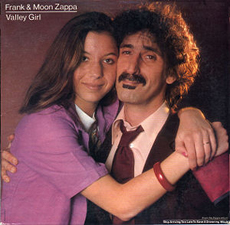 Feerick — I find Zappa to be incredibly overrrated, always have; his much-vaunted musicianship leaves me cold. Nor do I find him particularly funny — and in a weird way I think that’s by design. The occasional droll non sequitur (”Is that a real poncho, or is that a Sears poncho?”) hit the mark, but his stock in trade was writing ”funny” songs that weren’t actually funny. Like, they had the trappings of humor, to show how clued-in Frank was, and how aware he was of the absurdities of the music business, but they weren’t actually supposed to make you laugh. They were supposed to make you smirk, and feel superior. Make you feel clued-in. Like Frank himself.
Feerick — I find Zappa to be incredibly overrrated, always have; his much-vaunted musicianship leaves me cold. Nor do I find him particularly funny — and in a weird way I think that’s by design. The occasional droll non sequitur (”Is that a real poncho, or is that a Sears poncho?”) hit the mark, but his stock in trade was writing ”funny” songs that weren’t actually funny. Like, they had the trappings of humor, to show how clued-in Frank was, and how aware he was of the absurdities of the music business, but they weren’t actually supposed to make you laugh. They were supposed to make you smirk, and feel superior. Make you feel clued-in. Like Frank himself.
Lifton — Hearing this for the first time in 30 years, I’m focusing less on Moon Unit and more on Frank’s track.
Nope, still don’t like it.
Feerick — Oh, if ”Valley Girl” succeeds (and I think it does — humor is subjective, I guess) it does so despite Frank. His bits drag the whole thing down, lacking any wit. The music is well-executed and tight — too tight for any sense of playfulness. But any kick to the song is all down to Moon’s delivery, which is wonderfully loopy and unaffected. Probably the last time a Valley Girl accent could be called unaffected.
The casual homophobia is a drag, though; guess the apple doesn’t fall too far from the tree.
Wiencek — For inadvertently mainlining this degraded surfer patois into American culture, Frank Zappa unfortunately has a lot to answer for. I hated this as a kid, because I hated that sound, those horrible mutilated vowels (fronted vowels, for you linguists) and rising, question-like intonation. Yes, it was a few more years before I would grasp the concept of satire. Now that I do, I come back to this song surprised at how not-good-natured it is; it wouldn’t be until Beavis and Butt-head in the ’90s that so many teenagers would willingly embrace such a degrading view of themselves. And I wonder if, lo these many years later, Moon Unit is still having to explain to people that she doesn’t really talk like that.
Cummings — Most of the impact this track had on my little community of music fans in the portion of southwestern Virginia known as the “New River Valley” was indirect, at best. It received no local radio airplay, we didn’t have MTV, and so it only spread by word of mouth and passed-along 45s. But considering all that, has any 3-minute song, before or since, had such an outsized impact on the way kids speak and behave? Back home, we were soon calling my female classmates “New River Valley Girls” and talking like every other white kid in the country did through much of the rest of the decade. Honestly – where would we all be today, semantically speaking, without this song? (And wouldn’t we rather be in that other place?)
Murphy — My wife heard this song for the first time a few months ago (driving through Buffalo listening to Toronto’s impressive BOOM 97.3). She wasn’t a fan. One of those songs that didn’t get a ton of airplay, but definitely had some buzz, especially with the ”older kids.”
The summer of ’82 was all about “Valley Girl” speak, and deelyboppers. Anyone remember deelyboppers? Those goofy things people would wear on their heads? You’d get ’em at carnivals and fairs. Maybe that was just a northeast thing. Oh… and the Pepsi Challenge. That was big that summer. I could go on, but I won’t.
#19 Trio, ”Da Da Da” (1982)
Charted in over 30 countries, though it peaked at #33 in the US Dance charts; #2 UK, #3 Canada.
[youtube id=”lNYcviXK4rg” width=”600″ height=”350″]
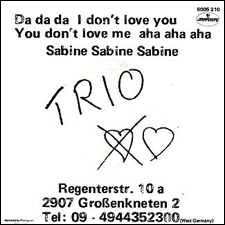 Feerick — Full title: ”Da Da Da (I Don’t Love You You Don’t Love Me Aha Aha Aha)”…or, ”How to have a Massive International Hit (Without Really Trying).” Three minutes of half-assed vocal goofing over the ”demo” track on a Casio. Did it really take three people to make this record?
Feerick — Full title: ”Da Da Da (I Don’t Love You You Don’t Love Me Aha Aha Aha)”…or, ”How to have a Massive International Hit (Without Really Trying).” Three minutes of half-assed vocal goofing over the ”demo” track on a Casio. Did it really take three people to make this record?
Wiencek — This song is inconsequential, knows it, and doesn’t care less. Good for it.
Cummings — Having owned a VW Golf for a year after my wife and I moved to England — that year (1998-99) having happened to be the one after the classic “It fits your life … or complete lack thereof” commercial — I had this song bouncing around in my head WAY too often during that time period. However, I must admit that this is the first time I ever heard the entire original track — or even knew there was an entire original track.
[youtube id=”c_i5LL5RVNA” width=”600″ height=”350″]Dunphy — As others have already said, without Volkswagen, this song would be virtually nonexistent. It means nothing to me.
Feerick — Oh, Vienna…
Lifton — “Twist and Shout” recast as German synth-pop minimalism? Fuck that shit.
Murphy — I remember stumbling across this song on the radio circa late ’82-early ’83. Heard it on a distant AM station out of Canada. Didn’t know what to make of it. Amazingly, MTV never played the video. Features the legendary “Rock 1” drum pattern preset on the Casio VL Tone keyboard. Probably the most sampled keyboard preset ever — used by everyone from Deee-Lite to Fergie. Radio Shack released their own version of the keyboard. Sounded exactly the same as the Casio, but it was made by Realistic. Got that bad boy for Christmas 1983. Have a photo of me playing it while wearing an Atari Missile Command t-shirt. I was cool.
#20 The GAP Band, ”You Dropped a Bomb On Me” (1982)
Peaked at #2 on the R&B charts.
[youtube id=”17lkdqoLt44″ width=”600″ height=”350″]
Lifton — Most 80s funk leaves me cold, but this is damn near irresistible.
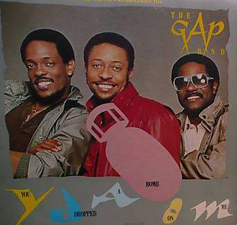 Wiencek — Meh. This never did anything for me, and doesn’t now. Maybe because the vocal reminded me a little of “You Ain’t Seen Nothing Yet,” which I didn’t want to be reminded of. Pass.
Wiencek — Meh. This never did anything for me, and doesn’t now. Maybe because the vocal reminded me a little of “You Ain’t Seen Nothing Yet,” which I didn’t want to be reminded of. Pass.
Cummings — Back in the fall of 1990, my (future) wife and I moved into a newly renovated apartment building in West Philadelphia that featured, as it turned out, remarkably thin walls.
We discovered this fact the first week, when our next-door neighbor came home at 2 AM or later several nights in a row, cranked his stereo up to 10, and dropped the needle on the GAP Band’s Greatest Hits album. The dude — whom we came to call “Clubfoot,” because we didn’t know him, didn’t like him, and he had a broken foot at the time — actually preferred the peel-out intro to “Burn Rubber (Why You Want to Hurt Me),” which he would play (along with “You Dropped a Bomb”) over and over again while I pounded on the wall with my fist. Eventually, I pounded so hard on that paper-thin wall that I knocked something over on his side, which led to a loud argument at my door and (finally) some relief on the decibel levels and timing. That experience burned the intros to those two songs into my head, and they’ve never left.
Great songs, though.
Feerick — Mm. We featured ”Burn Rubber On Me” on the Road Trip mixtape from a couple of years ago, which is not only a huge kick — it’s the exact same song.
That’s okay, though. It’s perfectly acceptable to be a one-trick pony, when the trick — that enormous synth bass, choruses built for junior-high dancefloor singalongs — is this good.
Murphy — Like so many other people, I associate this with the Dazz Band’s (Cleveland represent!) similarly spacey ”Let It Whip.” Definitely one of those songs that was bigger than its peak chart position led you to believe.
In early ’91, some radio stations put the track back into rotation when the Gulf War broke out. Tasteless? Maybe. Awesome? Abso-poopin’-lutely. Do that now and people start picketing and shit. Don’t get me started!
Feerick — Shine on, Joel Crazy Diamond.
Dunphy — What makes for a fun mixtape: This, Dazz Band’s “Let It Whip,” Cameo’s “Word Up,” and because y’all better settle down “You Can’t Change That” by Raydio.





Comments